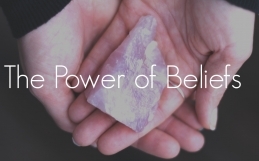A lot of us are logical. We love to think, analyze, and plan. When things make sense, we’re happy. However there is a completely different side of intelligence for us to utilize: emotion.
As women, we are actually well equipped to embrace emotional intelligence. Because we were created to give and support life (think procreation), we were given the ability to be deeply in tune with our own and others’ needs and feelings. We’ve evolved beyond just having and raising kids, but innately we’re still blessed with an emotional depth and sensitivity to help us and those around us survive.
“Our ability to distinguish, understand, and have greater awareness of how our thoughts and feelings connect with our outwards displays and behaviors, as well as the ability to manage and express appropriate emotions and help others do the same.” – Bruce D. Schneider
The benefits of having a high emotional intelligence are long and substantial, including:
- A better relationship with and understanding of yourself
- Improved relationships with friends, family, and co-workers
- Decreased stress and conflict
- Greater decision-making and leadership ability
- A higher overall level of consciousness
- Healthier and more sustainable romantic relationships
- More energy
There are 3 Keys to Raising Your Emotional Intelligence, the first is awareness of emotion.
Emotions are neither good nor bad. They simply have a purpose, and offer signals and clues to our thought processes and patterns. These feelings have valuable information and energy for us.
Take a step back, and observe your emotions. When you are in the middle of intense emotion, it is almost impossible to clearly and consciously note what is happening. Instead of being caught up inside the feeling, imagine yourself gaining a bird’s eye view of what’s going on and answer the following questions:
- What does your emotion feel like as a sensation in your body?
- Where in your body do you feel fear? Frustration? Joy? Love?
- What thoughts typically run through your mind when you have a particular emotional reaction?
- Are you someone who expresses emotion freely and openly?
- How open are you to others coming to you with emotion?
When we are unaware of our feelings (hide or avoid them), we are not aware of how our emotional state is affecting or influencing other people. By gaining a deeper understanding of others’ emotions, it helps you not only connect with them, but also with yourself.
The Second Key to a High E.I. is the ability to express emotion in authentic, healthy ways.
We all have limiting beliefs about expressing emotion. Perhaps you feel there are certain environments that expressing emotion is inappropriate or unnecessary (at work maybe?). Or maybe you believe that expressing your feelings will create conflict or cause problems, so you avoid doing it. Maybe you never learned how to properly express your emotions in your childhood, and therefore don’t believe you can do it the right way. Well, let’s disband some of those beliefs. How true are they really?
Expressing emotion comes in many forms. Being highly expressive doesn’t mean you or someone knows how to properly share their feelings… it just means they know how to display them at a higher intensity. Think about someone sighing really loudly in disgust when they don’t approve, or rolling their eyes at something they find ridiculous. Those people clearly are very expressive, but often in an inappropriate way.
Emotional Intelligence is the practice of expressing emotions in the most appropriate way in any situation. This means rather than merely reacting to the emotion, we are aware of it, and choose to respond with finesse in communicating how we feel.
When it comes to navigating the realms of the heart, and the pathways of expression, it’s an individual journey. Focus on sharing the truth of what you feel for the most authentic expression, and focus on creating the best outcome for yourself and others when finding the most appropriate expression. It takes some experimenting, and there’s not a black and white/right and wrong dry line here. Play with your expression and see what is most effective and what feels best to you.
This is one of the most effect lines to use in expressing how you feel: “I am noticing I’m feeling ________________ when ________________.” This allow you to share how you feel, without blaming or dumping on another.
The 3rd Key to a high E.I. is managing and controlling your emotions, that is, to be in power of your emotions and how you choose to feel and express them.
If you want to be successful in your work, relationships, and in life in general managing and controlling your emotions is vital. Your ability to exhibit self control and self awareness when it comes to your feelings gives you the ability to live your life the way you want, rather than let your feelings take over and run the show.
The first step to gaining control of our feelings is recognizing: You always have a choice in how you want to respond to a feeling. Many emotions become much easier to handle when we remove the heavy judgment from them. You can handle anger or fear, but when you wrap it up in so much blame/shame and start beating yourself up, you trigger overwhelm and things get even more challenging.
Embrace and honor your feelings. They are there for a reason, and in important one at that! Each emotion is there to inform you of something, and then give you the energy you need to take action to get yourself back into alignment if something is off.
“Feelings are much like waves, you can’t stop them from coming, but you can choose which ones you surf.” – Jonatan Martensson
When your perspective changes, so do your feelings. Have you ever been in a situation where you were incredibly angry and then you found out something about your experience you didn’t know before. Suddenly with new information, you have a new thought about what just happened and then your feelings about the situation change as well.
Ex: My date doesn’t show up, and doesn’t call. I’m stood up and rightfully upset and angry about the situation. But then, I find out the next day that his mother was in the hospital for emergency surgery, and all of his focus and attention was there so he didn’t even think to call in that moment. Suddenly, I’m no longer angry because I realize he was taking care of his family, not ignoring or abandoning me. I feel concern and empathy, instead of anger or frustration.
The key to managing and controlling your emotions is relaxing and responding instead of reacting. When we react we are at the affect of our circumstances. When we respond we choose how we want to behave in response to what just happened.
This applies to how you respond within yourself as well. Do you get upset anytime you are angry, because you don’t think you should be? Or do you feel ashamed when certain desires arise that you learned we’re bad or wrong from a parent, teacher, or church?
As you observe and become more aware of your displays of emotions this week repeat this mantra to yourself whenever feelings come up: “My feelings have a purpose. I open up to receive the energy and information they are bringing me right now.”
I use a highly effective Feeling Framework with all my VIP clients. It teaches you how to feel your feelings in the most soulful, effective way. If you want more information on the feelings framework, or when courses will open up around it, send us an email to: team@www.test.workwithsoul.com.





